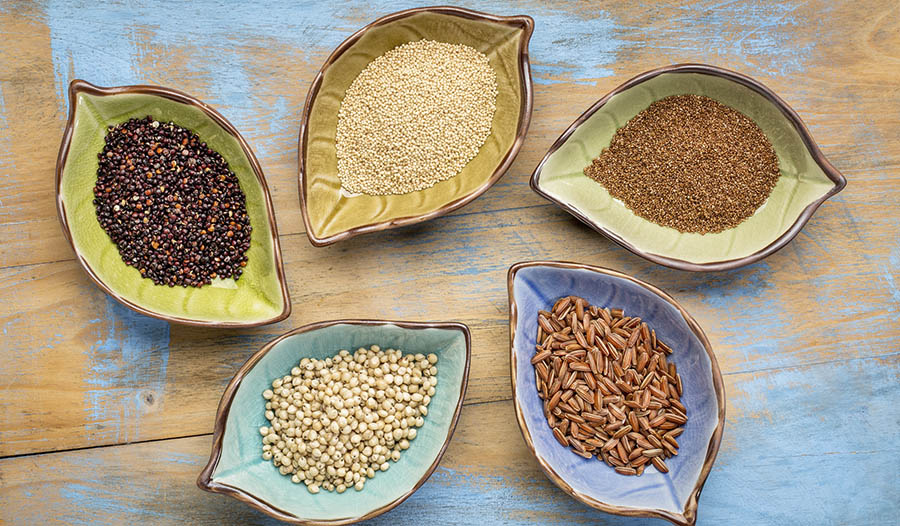Πώς οι υδατάνθρακες υποστηρίζουν μια υγιεινή διατροφή

Αν και οι υδατάνθρακες συχνά αποκτούν μεγάλη φήμη, μερικές από τις πιο υγιεινές τροφές που μπορείτε να φάτε, όπως τα φρούτα και τα λαχανικά είναι κυρίως υδατάνθρακες. Όχι μόνο αυτό, αλλά μερικά από τα τρόφιμα που θεωρούμε ως «υδατάνθρακες», όπως ζυμαρικά ή πατάτες, περιέχουν επίσης μια σημαντική ποσότητα πρωτεΐνης!
Οι υδατάνθρακες δεν είναι ο εχθρός όταν πρόκειται για τη διαχείριση του βάρους σας. Αλλά διάφοροι τύποι υδατανθράκων επηρεάζουν την όρεξη και την ενέργειά σας διαφορετικά - και αυτό μπορεί είτε να βοηθήσει είτε να εμποδίσει τις προσπάθειές σας για τη διαχείριση του βάρους. Ας ξεκαθαρίσουμε κάποια κοινή σύγχυση υδατανθράκων και ας ρίξουμε μια ματιά στο πώς οι υδατάνθρακες ταιριάζουν σε μια υγιεινή διατροφή.
Τι είναι οι υδατάνθρακες;
Πρώτα απ' όλα: οι υδατάνθρακες είναι ένα από τα τρία μακροθρεπτικά συστατικά που αποτελούν το μεγαλύτερο μέρος της τροφής που τρώμε. (Τα άλλα δύο μακροθρεπτικά συστατικά είναι το λίπος και η πρωτεΐνη.) Οι υδατάνθρακες μπορούν περαιτέρω να χωριστούν σε τρεις υποκατηγορίες: σάκχαρα, άμυλα και φυτικές ίνες. Κάθε ένα από αυτά συμπεριφέρεται διαφορετικά στο σώμα.
- Τα σάκχαρα (γνωστά και ως απλοί υδατάνθρακες) είναι μικρά μόρια που απορροφώνται γρήγορα στην κυκλοφορία του αίματος. Θα τα βρείτε σε φρούτα και γάλα καθώς και σε γλυκαντικά όπως μέλι, σιρόπι σφενδάμου και επιτραπέζια ζάχαρη.
- Τα άμυλα (γνωστά και ως σύνθετοι υδατάνθρακες) είναι μεγαλύτερα μόρια που αποτελούνται από εκατοντάδες (ή ακόμα και χιλιάδες!) από μόρια σακχάρου αλυσοδεμένα μεταξύ τους. Αυτά χρειάζονται λίγο περισσότερο χρόνο για να αφομοιωθούν και να απορροφηθούν. Θα τα βρείτε σε δημητριακά, όσπρια, πατάτες και άλλα αμυλούχα λαχανικά.
- Οι ίνες είναι ένας τύπος υδατανθράκων που δεν μπορούν να αφομοιωθούν από τον άνθρωπο - αλλά παρέχουν μια πολύτιμη πηγή τροφής για τα ευεργετικά βακτήρια που ζουν στα έντερα μας και μας βοηθούν να διατηρούμε υγιείς. Ολόκληρα φρούτα, λαχανικά, όσπρια και δημητριακά παρέχουν φυτικές ίνες.
Απλοί υδατάνθρακες έναντι σύνθετων υδατανθράκων
Δύο άλλοι όροι που θα βλέπετε συχνά να χρησιμοποιούνται σε σχέση με τους υδατάνθρακες είναι εξευγενισμένοι και μη επεξεργασμένοι. Αυτά μερικές φορές συγχέονται με απλά και πολύπλοκα αλλά δεν είναι καθόλου το ίδιο πράγμα.
Οι όροι «απλό» και «σύνθετο» αναφέρονται στο μέγεθος του μορίου υδατάνθρακα ή αν μιλάμε για ένα μικρότερο μόριο σακχάρου ή ένα μεγαλύτερο μόριο αμύλου. Οι όροι «εξευγενισμένο» και «μη επεξεργασμένο» δεν έχουν καμία σχέση με το μέγεθος του μορίου · αντίθετα, αναφέρονται στον βαθμό επεξεργασίας.
- Απλοί υδατάνθρακες (σάκχαρα) βρίσκονται τόσο σε εξευγενισμένες όσο και σε μη επεξεργασμένες μορφές. Ο πίνακας ζάχαρη και ο χυμός μήλου είναι παραδείγματα ραφιναρισμένων σακχάρων. Το σιρόπι σφενδάμου θα ήταν ένα παράδειγμα μη επεξεργασμένης ζάχαρης. Τα φυσικά σάκχαρα στα φρέσκα φρούτα είναι επίσης μη επεξεργασμένα.
- Οι σύνθετοι υδατάνθρακες (άμυλα) βρίσκονται επίσης τόσο σε εξευγενισμένες όσο και σε μη επεξεργασμένες μορφές. Το λευκό ψωμί, φτιαγμένο από εξευγενισμένο λευκό αλεύρι, μπορεί να περιγραφεί ως εξευγενισμένος υδατάνθρακας, αλλά εξακολουθεί να περιέχει σύνθετους υδατάνθρακες. Τα δημητριακά ολικής αλέσεως και οι αμυλούχοι κόνδυλοι, από την άλλη πλευρά, περιέχουν σύνθετους υδατάνθρακες στις μη επεξεργασμένες μορφές τους.
Αξίζει να σημειωθεί ότι ενώ η διαφορά μεταξύ απλών και σύνθετων υδατανθράκων (δηλαδή σακχάρων και αμύλων) είναι αρκετά ασπρόμαυρη, η διάκριση μεταξύ εξευγενισμένων και μη επεξεργασμένων υδατανθράκων είναι λίγο πιο ασαφής. Μου αρέσει να το σκέφτομαι περισσότερο σαν ένα φάσμα. Για παράδειγμα, το αλεύρι ολικής αλέσεως είναι πιο εξευγενισμένο (ή επεξεργασμένο) από τους ολόκληρους, άθικτους κόκκους, αλλά λιγότερο εξευγενισμένο από το λευκό αλεύρι.
Ποιοι τύποι υδατανθράκων είναι καλύτεροι;
Τώρα που έχουμε ξεχάσει όλους τους ορισμούς, ας μιλήσουμε για το πώς διαφορετικοί τύποι υδατανθράκων μπορούν να βοηθήσουν (ή να εμποδίσουν) τους στόχους διατροφής και διαχείρισης βάρους σας.
Όταν πρόκειται για τη διαχείριση της όρεξης, των επιπέδων ενέργειας και της πρόσληψης θερμίδων, οι μη επεξεργασμένοι υδατάνθρακες από ολόκληρα φρούτα, λαχανικά, όσπρια και ολόκληρα δημητριακά είναι ο σωστός τρόπος. Όχι μόνο αυτοί οι μη επεξεργασμένοι υδατάνθρακες διατηρούν περισσότερα θρεπτικά συστατικά από τους πιο εκλεπτυσμένους ομολόγους τους, αλλά γενικά περιλαμβάνουν επίσης περισσότερες φυτικές ίνες- και αυτό μπορεί να σας βοηθήσει να γεμίσετε με λιγότερες θερμίδες. Ένα μπολ με tabbouleh φτιαγμένο με σιτάρι πλιγούρι (ένας μη επεξεργασμένος σύνθετος υδατάνθρακας) πιθανότατα θα σας βοηθήσει πολύ περισσότερο από ένα κουλούρι (ένας εξευγενισμένος σύνθετος υδατάνθρακας).
Φυσικά, είναι δυνατόν να παρακάνετε σχεδόν οτιδήποτε. Αν και τα τρόφιμα ολικής αλέσεως είναι πιο θρεπτικά από τα εκλεπτυσμένα αντίστοιχα, εξακολουθούν να είναι μια σχετικά συγκεντρωμένη πηγή θερμίδων. Μην αφήσετε το γεγονός ότι είναι ολικής αλέσεως να σας αποπλανήσει να σκεφτείτε ότι δεν χρειάζεται να δώσετε προσοχή στο μέγεθος της μερίδας.
Οι φυτικές ίνες στους μη επεξεργασμένους υδατάνθρακες βοηθούν επίσης στην επιβράδυνση της απορρόφησης των σακχάρων από τα τρόφιμα στην κυκλοφορία του αίματος σας. Σταθερότερο σάκχαρο στο αίμα σημαίνει σταθερότερη ενέργεια (για να μην αναφέρουμε χαμηλότερο κίνδυνο διαβήτη). Ίσως αυτός είναι ο λόγος για τον οποίο η κατανάλωση ποτών με ζάχαρη (ένας εξευγενισμένος απλός υδατάνθρακας) σχετίζεται με αυξημένο κίνδυνο διαβήτη, ενώ η κατανάλωση ολόκληρων φρούτων (ένας μη επεξεργασμένος απλός υδατάνθρακας) σχετίζεται με μειωμένο κίνδυνο.
Όσον αφορά τα μη αμυλούχα λαχανικά, από την άλλη πλευρά, είναι δύσκολο να το παρακάνετε. Παρόλο που περιέχουν κυρίως απλούς υδατάνθρακες, είναι σχετικά χαμηλές σε θερμίδες και γεμάτες διατροφή.
ΑΠΟΠΟΙΗΣΗ ΕΥΘΥΝΗΣ:Αυτό το Κέντρο Ευεξίας δεν προορίζεται να παρέχει διάγνωση...


























































































